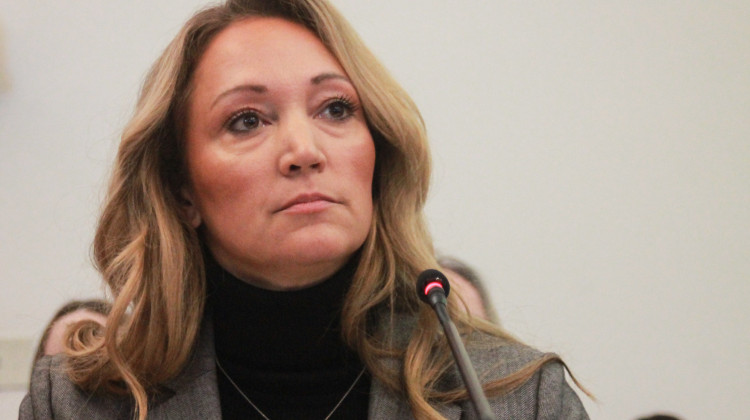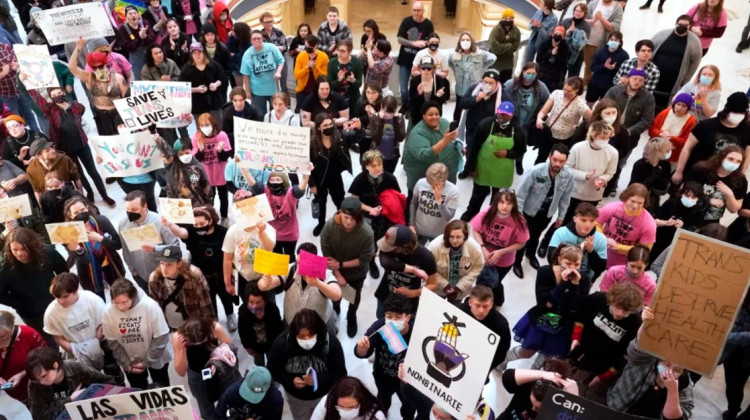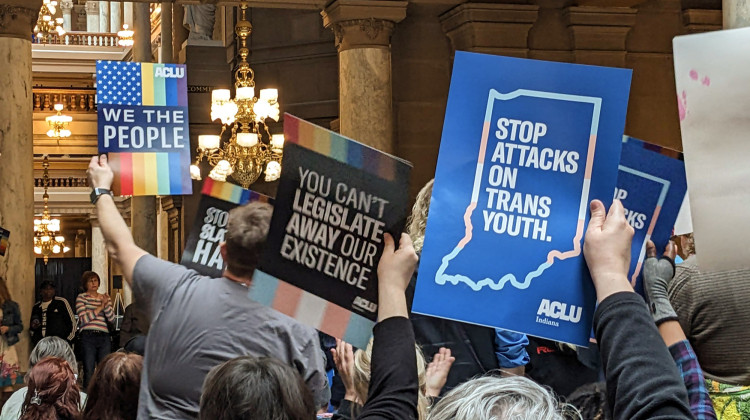
Overdose Lifeline founder Justin Phillips in the organization's new headquarters.
Lindsey Wright/WFIUIt’s been about six months since the Trump administration declared a nation-wide public health emergency due to the opioid crisis, but many are wondering what’s changed.
President Donald Trump says federal leaders will roll out a policy plan in the next few weeks, and local advocates hope to see less talk, and more action.
‘Keep doing the good work’
Overdose Lifeline has been at the forefront of the opioid crisis in Indiana for years. Until recently, the non-profit’s founder, Justin Phillips, says the group was crammed into a small space, with little storage.
“We just had outgrown the space we were because we’ve got intern participation from both Purdue and IU and added a staff so we could fully implement our prevention program,” Phillips says.
The organization moved into a larger space about a month ago. Phillips points out two large rooms, a front desk area and a spacious storage closet.
“We have storage now for all the naloxone,” she says. “At one point in time, we had the naloxone off site in a secure storage. Now we can do it here, which is so much better for us.”

Phillips says the expanded space will help them improve efforts to curb the opioid epidemic.
“I hate that the need is still so big and that the problem is still really complex, and feels insurmountable,” she says. “But I’m glad that we get to keep doing the good work.”
More than 100 people in the country die every day due to an opioid overdose. According to a recent report, drug overdoses in Indiana are growing faster than the national average, and death rates involving synthetic opioids doubled between 2015 and 2016.
Phillips says we can’t keep talking about the issue. It’s time to act.
Experts: Local Leaders Should Hold Federal Officials Accountable
National leaders promised more action at a recent White House opioid summit. Health and Human Services Secretary Alex Azar says they’ve been working to increase treatment and implement prevention and response efforts. He says states can also get waivers for Medicaid to cover medical assisted treatment like methadone for example, which he says is essential.
Azar says President Donald Trump’s budget also proposes doubling state grants for prevention and treatment from $500 million to $1 billion a year.
“We announced a new method of technical assistance in November to use more local experts and expertise to provide technical assistance to states and grantees rather than a traditional, one size fits all approach from Washington,” Azar says.
Dennis Watson, an associate professor at the Richard M. Fairbanks School of Public Health, says local involvement will make a difference and Indiana needs to hold national leaders accountable.
“Things at the national level, they can trickle down somewhat, and they’re going to states in terms of policies that make certain funding available, but at the end of the day it’s the states figuring out how to use it,” Watson says.
Watson says researchers at the school have been studying these issues and are currently working on a few major projects. Some of the research shows opioid use decreased by more than 30 percent within six months for those using medication assisted treatment in some Indiana counties. But he says people need social support too.
“If you don’t have a job and you don’t have a car, how are you going to pay for treatment and how are you going to get to treatment?” he says. “Those are things we leave out of programming.”
Housing and Urban Development Secretary Ben Carson during the summit touched on the lack of sustainable housing options and other social barriers for those with addiction.
Trump says the administration is working to roll out what he says will be a “strong” policy plan in the next few weeks. During the summit, he emphasized the need for harsher penalties for drug dealers and even opioid distributors.
Hopefully we can do some litigation against the opioid companies. I think that’s very important,” Trump says. “A lot of states are doing it, but I keep saying if the states are doing it, why isn’t the federal government doing it.”
Several Indiana Counties have announced lawsuits against opioid manufacturers, including Vigo and Monroe Counties.
Other national departments say they’re working more than ever to crack down on illegal drug trafficking and to prevent drugs from entering the country in the first place.
Working Locally on Education Efforts
While officials continue discussing the issue, Overdose Lifeline is trying to move past that by implementing online programs so people can access information.
“These programs, specifically about the opioid public health crisis that we have, is about everyone having the same piece of information so that we don’t have to have the summits but instead we’re all on the same page,” Phillips says.
Thank you cards she received from 9th grade students show her taking action is what makes a difference.
Advocates, including health experts and faith leaders are holding a “People’s Hearing” on the opioid crisis next week. According to a media advisory, they will express opinions that elected officials need to put an end to incarcerating people.
 DONATE
DONATE










 Support WFYI. We can't do it without you.
Support WFYI. We can't do it without you.